In the belly of the monster
Thanks for the encouraging feedback. Whatever you mean by it, it’s enough for me to keep at it . This chapter is our last 6 days in Vancouver, before Len headed back over the Atlantic and I made the risky entrance into the belly of the monster. As far as I know that phrase comes from Jose Marti’s account of his visit to the USA from Cuba around 130 years ago.
I’ve had one full day in Vancouver, and a lot of relaxed wandering and resting that lead to these more random images. Len’s spent time getting familiar with places he might live next year if-when he gets a job, including very late nights out with a Leeds friend-of-a-friend who moved here, and Tim the hitchhiker we picked up on the way back from Jasper. We became dab hands at leaving a shoe in the hotel room door while taking the one room key to reception, so the other could get in later without disturbing a nap.
Whalewatching. It’s always good to be outside on a sea boat. However, whale-watching is less rewarding than bear-watching. You get to see the whole bear. See the whale tail in the photo, flicked up as it dives down into the depths. ‘Wow, did you see that?’ No! We go back via a flat marker buoy which is guaranteed to have a few obliging sea lions lolling on it.
130 years ago… Vancouver had not long before been named as a formal place, in 1886, the same year as the first railway stretched across Canada. That's just 4 or 5 generations ago. Anything that looks vaguely weathered is classed as ancient and there’s not much of it. Timber has been the building material and it doesn’t last so long. I'm not used to this; most of Bradford’s terraces were already built 130 years ago…
Thousands of years ago. I’ve read Daughters of Copper Woman (thanks Len for finding me a copy), and I am feeling my brain hurting, caught between a resilient indigenous culture that long ago respected our environment, and modern profit ripping it up with hardly a tame restraint.
Ludi Simpson
12 chapters
11 Apr 2023
Vancouver, whales and crossing the U.S. border
Vancouver
Thanks for the encouraging feedback. Whatever you mean by it, it’s enough for me to keep at it . This chapter is our last 6 days in Vancouver, before Len headed back over the Atlantic and I made the risky entrance into the belly of the monster. As far as I know that phrase comes from Jose Marti’s account of his visit to the USA from Cuba around 130 years ago.
I’ve had one full day in Vancouver, and a lot of relaxed wandering and resting that lead to these more random images. Len’s spent time getting familiar with places he might live next year if-when he gets a job, including very late nights out with a Leeds friend-of-a-friend who moved here, and Tim the hitchhiker we picked up on the way back from Jasper. We became dab hands at leaving a shoe in the hotel room door while taking the one room key to reception, so the other could get in later without disturbing a nap.
Whalewatching. It’s always good to be outside on a sea boat. However, whale-watching is less rewarding than bear-watching. You get to see the whole bear. See the whale tail in the photo, flicked up as it dives down into the depths. ‘Wow, did you see that?’ No! We go back via a flat marker buoy which is guaranteed to have a few obliging sea lions lolling on it.
130 years ago… Vancouver had not long before been named as a formal place, in 1886, the same year as the first railway stretched across Canada. That's just 4 or 5 generations ago. Anything that looks vaguely weathered is classed as ancient and there’s not much of it. Timber has been the building material and it doesn’t last so long. I'm not used to this; most of Bradford’s terraces were already built 130 years ago…
Thousands of years ago. I’ve read Daughters of Copper Woman (thanks Len for finding me a copy), and I am feeling my brain hurting, caught between a resilient indigenous culture that long ago respected our environment, and modern profit ripping it up with hardly a tame restraint.
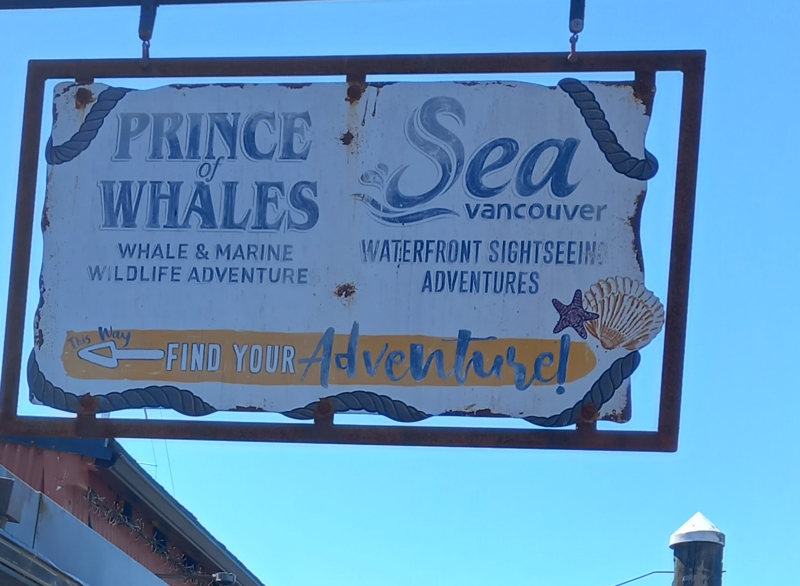
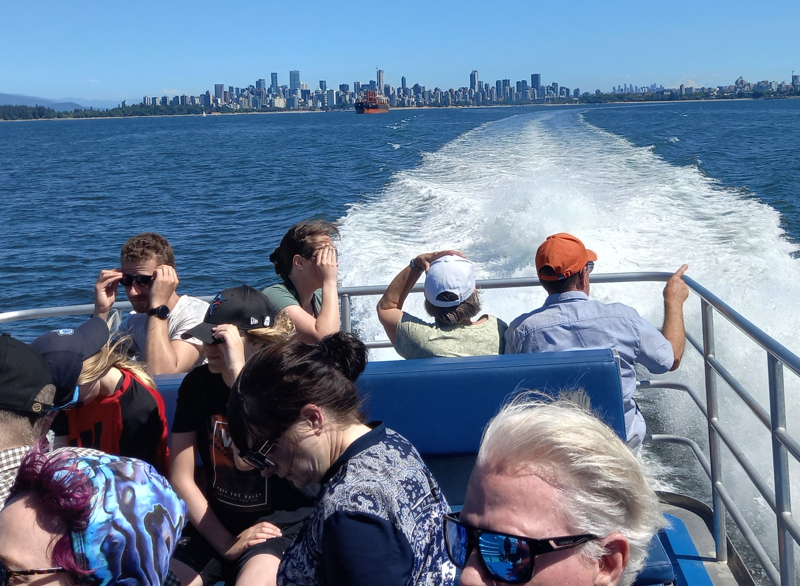
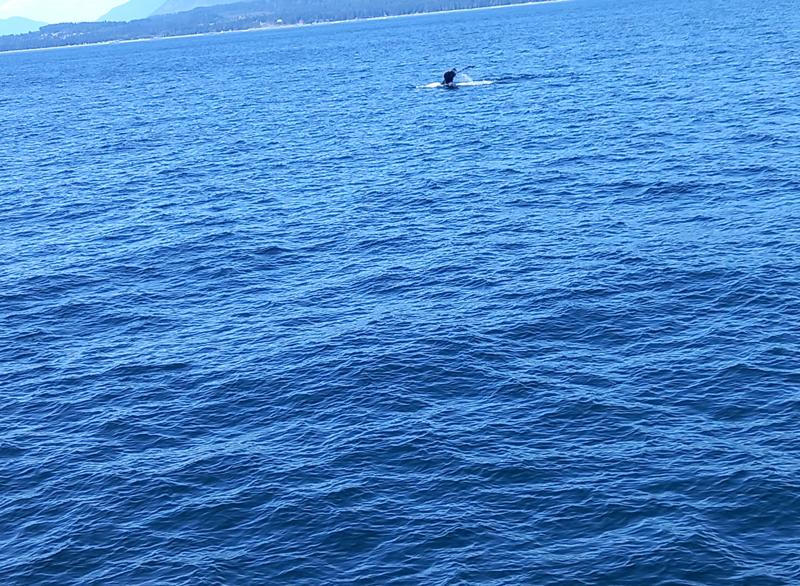
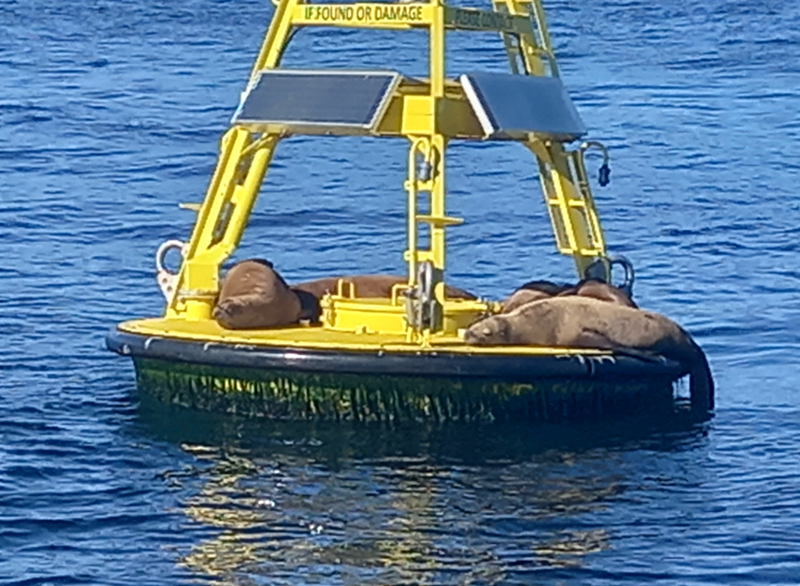
Indigenous forms are everywhere, in street art, in big project adverts, in a canoe race festival, as well as in the Bill Reid Museum which captivated me, shop included; Len is my mule. Among the traditional beauty, there is a panel of modern banknotes overpainted with portraits of indigenous women. Why does a camera record reflections that the human eye doesn't see? Bill Reid is the main acknowledged person of a handful of artists who rescued NW coast artistic forms by using them precisely and beautifully and to high standards in new works in the 1960s. It seems that the various art forms of the First Nations are a respected part of Canadian culture, now adopted by non-indigenous artists without pretension.
Meanwhile Canadian Police have unchecked racist elements, and elsewhere discrimination against First Nation people is apparently rife. I like the formal reference to buildings being present on 'unceded land’ of the Squamish or Musqueam or other First Nation, that at least acknowledges that the land was stolen. It's messy. The legal struggles to regain land for First Nation organisations has resulted more often in new greedy ownership rather than new social priorities. So First Nation land – on reservations – has been leased to developers who have bribed their way in with backhanders and
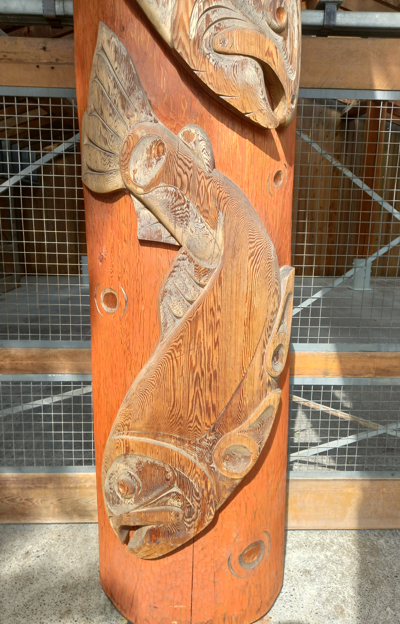
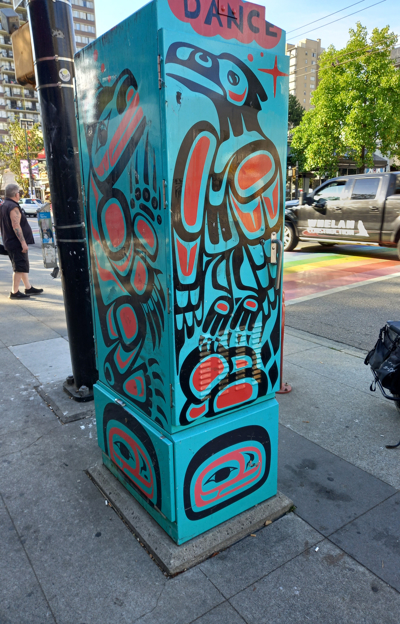
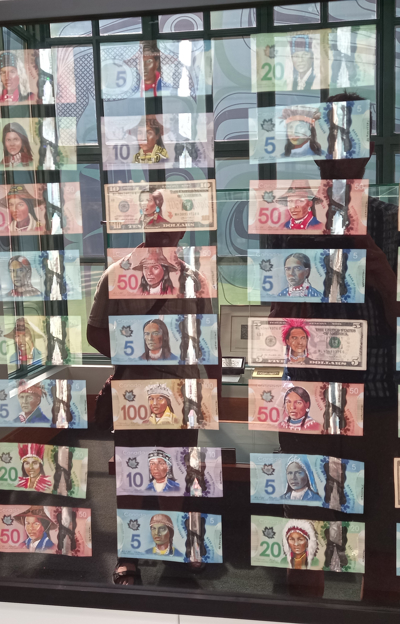
temporary jobs and short-term benefits to communal organisations.
It’s not so long since 1955 ended the banning of Potlatch – an indigenous ceremony of disinheritance where wealthy gave away their belongings to others. But the 1950s also ratcheted up The Snatch of indigenous children from their families to assimilate them into ‘civilised modern ways’. Bill Reid was one of those snatched and raised away from family. He turned to indigenous art only in his twenties, proving something.
USA 1 Vietnam 0. It's the Women's World Cup football, Canada are playing Nigeria. Are the bars full? No-one but us seems interested in their national team, and we're the only ones in the bar watching it. Same again the next day when I watch USA play Vietnam, no interest at all.
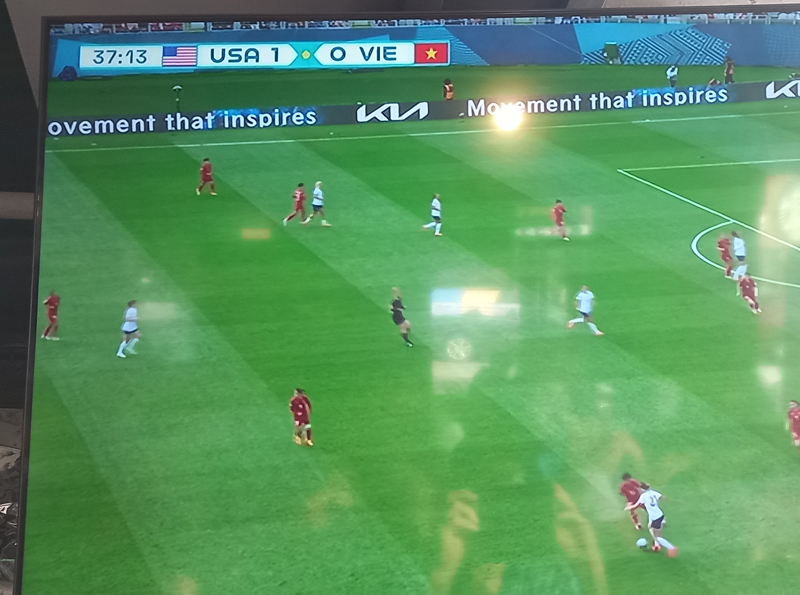
David Rovics in town. A socialist singer from Portland Oregon, he sang in a community church in East Vancouver to less than 50 people. I’ve seen him in Leeds and though I don’t rate his voice, his ballad-songs are brilliant, on the Rolls Royce engineers of East Kilbride who refused to work on Pinochet’s planes, on the Irish Battalion who fought for Mexico’s 1840s war with the USA, on US soldiers who sabotaged a ship taking napalm to Vietnam. I thought it might be a way to connect with Vancouver’s socialists, but my attempts at conversation with other audience failed totally.
Chinatown and developers. I went on a talk-and-tour by the designer of the Chinatown Memorial Plaza, which also has a statue commemorating the Chinese railway workers and World War veterans. The Plaza is visually integrated into the nearby park and Chinese Cultural Centre. The adjacent vacant ground has been bought by a developer and the City of Vancouver is happy for it to build a nine-story building that will overshadow the plaza. The big Chinese community is divided. Businesses tend to think that all those new residents will be customers and pay taxes. Some residents agree, others wonder where the housing for their poorer and elderly is to be found. Not in the ‘affordable’ slightly-less-than-market-value
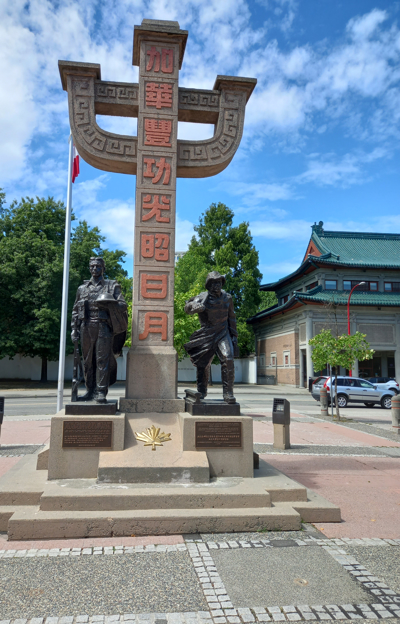
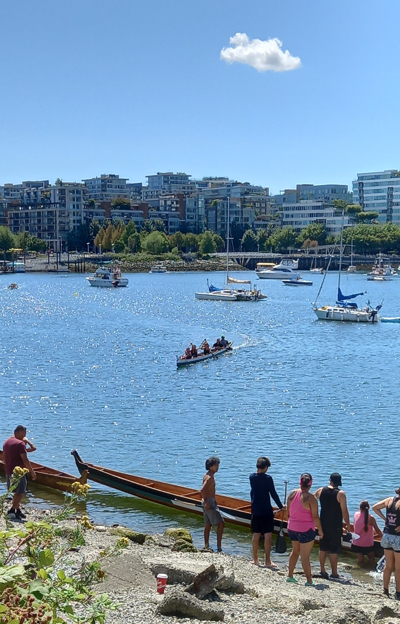
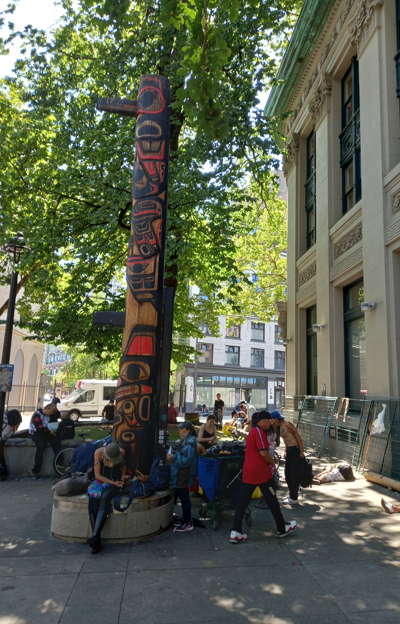
housing that’s promised. Too familiar aint it?
Drug legalisation and street homeless. Wandering in the middle of the day near Chinatown, I walked past hundreds of yards of pavement homeless, people looking very out of it, many physically disabled. Small amounts of hard drugs (opioids, cocaine, …) have been decriminalised from February this year in an attempt to make it easier for underlying issues to be dealt with by agencies other than police. Is more visible street homeless one result?Critics say there’s not enough resources for other agencies to offer ways out of drug dependency. Plenty of potential work for Len, then. Meanwhile, weed has been legal for a decade, and sold from government-licensed shops. You can have up to an ounce on you anytime for personal use, and up to a kilo at home, apparently that’s the equivalent of a harvest from four plants. Sounds like a lot to me, we used to make it last.
Thanks to Nathan who took us on tour of wealthier South Vancouver, including the logging stations of the Fraser River where great logs floated down from mountain forests are processed in sawmills and the timber shipped onwards. ‘What, you’ve not done a drive by the university?!’. So we do that and walk a bit on Spanish Sands, opposite English Bay, named for the colonisers’ first landings less than 300 years ago. The Spanish got here first but weren’t persistent enough. Nathan fills in
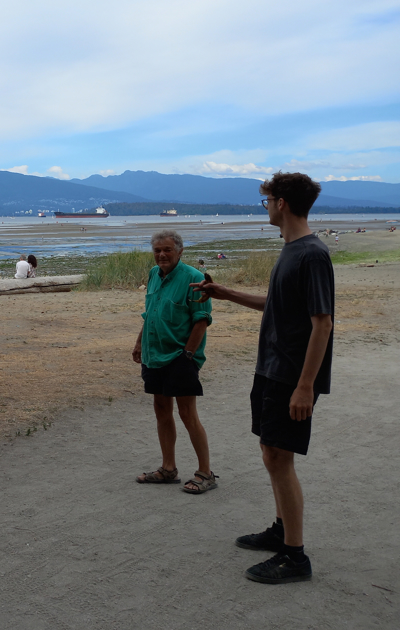
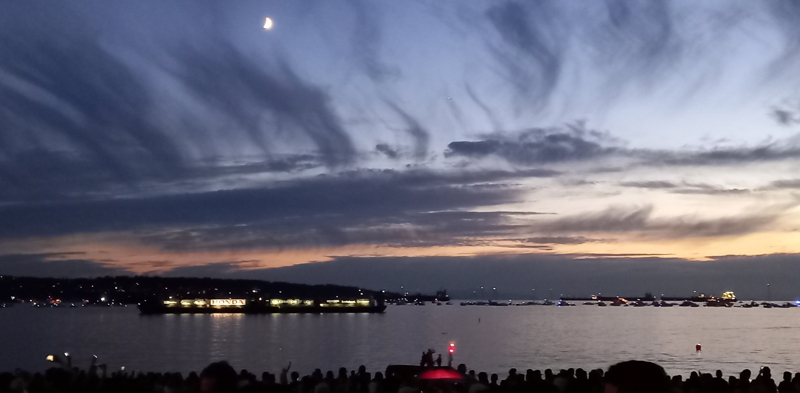
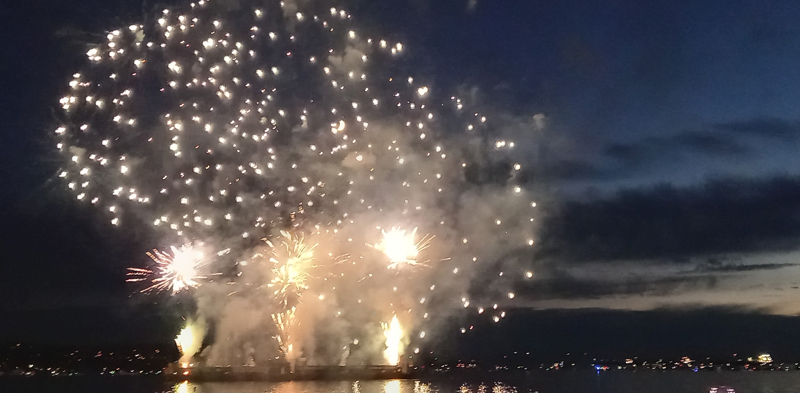
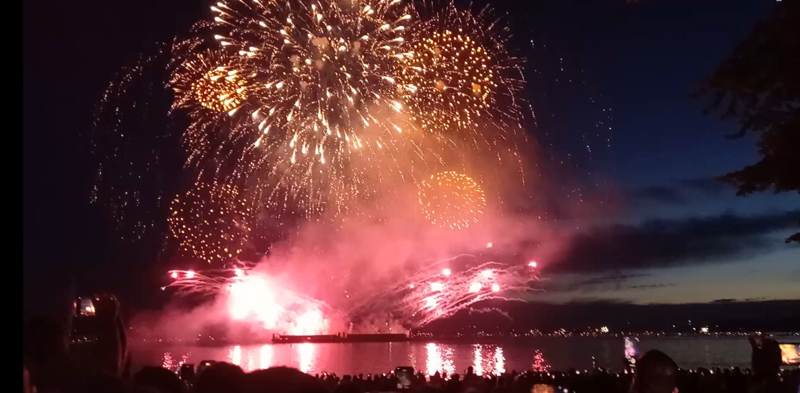
a lot of backstory to what we’ve seen. He laments the conservative developer-friendly unimaginative hierarchically organised City Council. I’m not bored . He says Vancouver should be renamed NW Surrey, as that’s the city with industry that's feeding British Columbia's prosperity.
Space. Passing a ramshackle shop in the middle of nowhere, I wonder about the impact of having a lot of cheap land… Maybe you can buy land to set up a business, and if it doesn’t go well you just keep stuff on the space, until decades later you have a sprawling empire and a faded sign: ‘We buy and sell anything’.
Space and water - fireworks night right outside our Hotel. Fabulous, though Len says nothing will be very good after Gandalf's show in Lord of the Rings.
Our rhythm. We’ve found it easy sharing space and time, Len and me. We’ve only eaten out twice, and mostly eaten well on supermarket food to suit Len’s diet and my frugality. Papaya and blueberry, delicious. Len offers counselling, which I appreciate but I think I’m not good at it!
Leaving. Rain on our last day, which Len says just emphasises what good weather we’ve had every other day except that one driving Jasper to Revelstoke. We take it easy, more Bezique in cafes (I’m
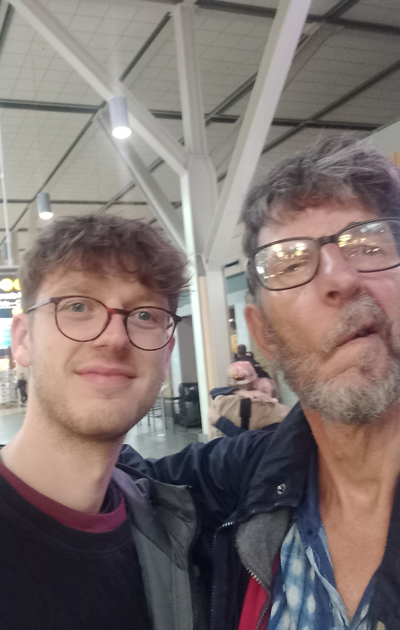
winning now), and arrive with all our luggage at Vancouver International Airport. Len’s slightly concerned that his yoghurt drinks may be taken off him. I’m slightly concerned that after we’ve parted I will be getting a bus to go South through US border control.
Back in Vancouver, the Greyhound driver Adam is really straight and welcoming to the fewer than 20 on his 50-seater. He gets very hot under the collar about a late-comer couple attempting without permission to get ‘unknown on my coach, potentially harming me, my coach, and my passengers’. Not humorous.
The U.S. border police aren’t humorous either. ‘When are you leaving the USA?’ 19th October. ‘No!’ I explain far too complicatedly that I’ve a flight back to England on 19th October from Vancouver so I’ll leave the States some time before that. ‘No! It’s July’. Silence. He looks at his screen. Moves to other questions about how much money I have, where I’m going, who I’m visiting. In the end I get it that he wont say that he’s realised that 24th July to 19th October is after all less than the 90 days that a visa waiver allows. So that’s OK. I’m on my way. They do not have a record of my arrests or visits to Cuba or anything else. I had been ready with ‘Oh, I thought sitting in the road was a traffic offence that didn’t matter to you, Sir. Oh, that was a long time ago, I was much younger.’
Arrive in Seattle downtown near the train station past 10pm, with no data – my SIM bought in the UK just hasn’t worked except for calls and texts. Adam the driver rescues me by offering a tether to his phone’s data so at least I have the half-hour walk to the Green Tortoise Hostel mapped out on my phone. But for some reason the map disappears after I’ve set off. The streets are deserted at 10.30pm, why? I pass a bar labelled Speakeasy but it’s closed. There’s no place to pee. I trudge on uphill on the road I think should go near that hostel. No walkers except very out-of-it wanderers. A cyclist deliverer stops at a traffic light and puts me right for the last stretch.
Next is two and a half weeks in Seattle, hopefully helped to see the sights by Bradford’s friend in Seattle Mary Toutonghi, and Richard who I’ve met online just once, in George’s online book group. They are tenuous connections but right now they are beacons of light on a big dark ocean.
1.
Really, all this in 48 hours??
2.
Road trip to Alberta, bears and trees
3.
Vancouver, whales and crossing the U.S. border
4.
Seattle part 1: Innocence, home and water
5.
Seattle part 2: Food, guitars and Mount Rainier
6.
Cruise Alaska
7.
Trees and roads
8.
Chicago Socialism
9.
Train to the Grand Canyon
10.
San Fran, Yosemite National Park
11.
Road trip San Francisco to Madison
12.
Settled, Nurtured, Treading Water
Share your travel adventures like this!
Create your own travel blog in one step
Share with friends and family to follow your journey
Easy set up, no technical knowledge needed and unlimited storage!
© 2025 Travel Diaries. All rights reserved.